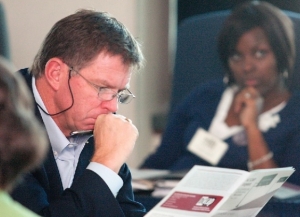Leaders share ideas for better programs for state's youths
By Phyllis Moore
Published in News on September 14, 2010 1:46 PM

News-Argus/TROY HERRING
Steve Keen, Wayne County commissioner, studies materials distributed during Monday's regional after-school summit held at Goldsboro City Hall. More than 60 community leaders, after-school providers and educators from 18 counties met to discuss ways to better serve youths across the state.
The N.C. Center for Afterschool Programs Monday unveiled a roadmap it hopes will help lawmakers better serve youths around the state.
More than 60 community leaders, after school providers and educators from 18 counties gathered at City Hall to discuss ways to expand access to quality after-school programs.
"Part of our conversation today is to figure out how can we better advocate for the needs of the students in a cross-sector way," said Geoff Coltrane, director of program and policy for the James B. Hunt Jr. Institute for Educational Leadership and Policy.
Ever since the 2009 session of the General Assembly, which followed the economic collapse, there has been ongoing discussion about how the deep cuts have affected children, including the elimination of an after-school program that served 15,000 children.
"During that session and the past session, NC CAP has really worked to pull all the different sectors that were serving these youth to get to try and get people to work together to try and save those funds," he said.
To identify the areas in which to work, Coltrane said 10 indicators were used -- including graduation rates, adults with a high school diploma, median household income, children without health insurance, teen pregnancy and juvenile delinquency rates.
The compilation unearthed a troubling trend, he said -- that not all of the counties are created equal.
"You could see pockets of excellence and pockets of despair," he said. "The challenge for us today is can all of us work on behalf of young people and will families work more effectively together than we do separately? How can we come together and pool our resources, our talents and our efforts?"
Jamie Knowles, NC CAP director, said, "Our state is at risk of becoming 'two North Carolinas' -- one populated by young people living in areas that are attracting jobs and industry and another populated by young people living in communities in a state of economic decline whose futures are bleak."
Goldsboro Mayor Al King said he has long been concerned about young people, particularly young black males. He said he was pleased that the submit meeting was brought to this area and optimistic about what such conversations might produce.
"We can't do it all alone, but we can sure start this movement and we need to take it to our legislators, local, state and federal," he said. "Money is part of it but it's easy for me to see, we can take the money that we're now spending to put these people in jail ... and use it for the purpose to rehab them and make them productive citizens."
Kristin O'Connor, N.C. Division of Social Services, said she wished some of the present data had been available 10 years ago when some of the initial grants were being written.
"The needs assessment is one of the more difficult sections of a grant. This is one way that will be helpful to start working, identifying where your needs are," she said. "Each of these indicators, when we drill down, might tell you a different story. I'm excited for everyone in this room to have this information. ... Many times our eastern counties are not scoring well on grant applications. Maybe we can begin to look a little differently at how we are awarding grants."
